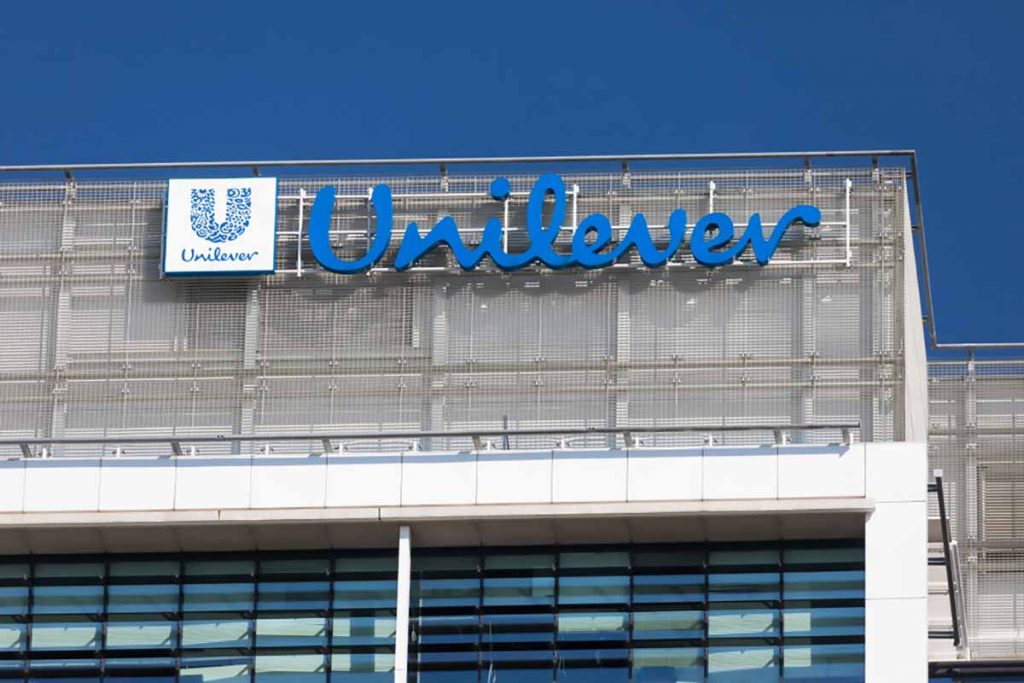
Unilever reported a 6-percentage-point increase in its post-consumer resin usage in 2020, outpacing most other large brand owners. | Konektus Photo/Shutterstock
Global packaged goods companies disclosed their post-consumer resin usage for 2020, and most of the biggies reported purchasing more recycled plastic than the year before.
Coca-Cola Co. had 11.5% post-consumer resin (PCR) across its packaging portfolio, PepsiCo 5%, Keurig Dr Pepper 2%, Danone 10.3%, and Unilever 11%. Those were all up from 2019, except for Danone, which reported a slight decrease.
The data was unveiled by the Ellen MacArthur Foundation as part of its Global Commitment 2021 Progress Report, which includes details on the recyclability of companies’ packaging, use of PCR, efforts to eliminate problematic materials, adoption of reusable packaging, and more. The companies reporting data have all signed on to a number of Global Commitment goals. This is the third year the Ellen MacArthur Foundation has reported their progress.
In terms of PCR usage, because the consumer goods companies are such huge users of plastic, even small percentage increases in PCR translate to a lot of recycled plastic. For example, The Coca-Cola Co. sold 2.96 million metric tons of plastic packaging in 2020, and at 11.5% PCR content, that comes out to roughly 341,000 metric tons of PCR.
The year before, the company sold 2.98 million metric tons of plastic packaging, 9.7% of which was PCR, or about 289,000 metric tons. The year-over-year difference: an additional 51,347 metric tons, or 113 million pounds, of PCR.
And PepsiCo used 2.35 million metric tons of plastic packaging in 2020, of which 5%, or roughly 118 million metric tons, was PCR. The year before, the Purchase, N.Y.-based company used 2.3 million metric tons of plastic packaging, of which 4%, or 92,000 metric tons, was PCR. The year-over-year difference was 25,500 metric tons, or 56 million pounds.
For the biggest companies, the percentage-point increases were fairly modest. Unilever, however, boosted its PCR percentage from 5% in 2019 to 11% in 2020, a substantial jump compared with others.
Still, the data also shows that most of the companies remain far from their 2025 targets, which vary by company. That was also one takeaway when California state officials released PCR usage data earlier this fall for beverage companies selling their products in that state.
The following are details on PCR usage by worldwide packaged goods companies, broken out by sector and organized from largest user of plastic packaging to smallest:
Beverage companies
The Coca-Cola Company: 11.5% PCR in 2020, up 1.8 percentage points from 2019
PepsiCo: 5% PCR, up 1 pp
Keurig Dr Pepper: 2% PCR, up 1.6 pp
Molson Coors Brewing Company: 1.6% PCR, up from 0%
Diageo: 5.4% PCR, up 2.9 pp
Spadel: 5.5% PCR, down 1.7 pp
innocent drinks: 31% PCR, up 2.7 pp
Pernod Ricard: 13% PCR, up 6.4 pp
Cosmetics
L’Oréal: 15.8% in 2020, up 8.7 percentage points from 2019
NATURA COSMETICS: 15%, up 6 pp
L’OCCITANE en Provence: 21.4%, up 6.7 pp
Food and snacks
Clif Bar & Company: 0% in 2020, no change from 2019
Ferrara: 0% (no 2019 data provided)
Nestlé: 4.2%, up 2.2 pp
Danone: 10.3%, down 0.3 pp
Mondelez International: 0.3%, no change
Mars, Incorporated: 0%, no change
Ferrero: 3.5%, no change
FrieslandCampina Nederland: 1%, up 0.1 pp
Kellogg Company: 0.09%, down 0.41 pp
Driscoll’s: 66.6% (no 2019 data provided)
McCormick & Company Inc.: 2.49%, up from 0%
McCain Foods: 0% (no 2019 data provided)
SOVENA: 0.6% (no 2019 data provided)
Zespri Group Limited: 11%, up 10 pp
Household and personal care
Werner & Mertz: 53.9% in 2020, up 1.9 percentage points from 2019
Freudenberg Home and Cleaning Solutions (FHCS): 0% (no 2019 data provided)
Unilever: 11%, up 6 pp
Henkel AG & Co.: 12%, up 3.5 pp
Colgate-Palmolive Company: 10%, up 3 pp
RB: 3.5%, up 0.5 pp
Johnson & Johnson Consumer Health: 1%, no change
The Clorox Company: 11%, no change
SC Johnson: 18.8%, up 3.07 pp
Beiersdorf: 1%, up from 0%
Essity AB: 2%, up from 0%
The report also goes beyond brand owners to include others in the plastic packaging value chain, including plastic producers. Among the plastics manufacturers that signed on to the commitment, those whose offerings included the largest percentages of PCR were China-headquartered Kingfa Sci. & Tech. Co. (7.17% PCR), Spain-based Plasticos Compuestos (6.1%), Thailand-based Indorama Ventures (6%), Spain-headquartered NOVAPET (3%) and Austria-based Borealis (1.9%).
The Ellen MacArthur Foundation detailed some of its own takeaways from the massive 2020 dataset. Combing through the information leads the foundation to believe that global virgin plastic use appears to have peaked and is set to fall between now and 2025. The foundation also said progress has been driven by recycling, but “much more focus is urgently needed on eliminating single-use packaging.”
That was a point also made by activist group Greenpeace, which called for a reduction in single-use plastic consumption in favor of reusable packaging. In a statement, Graham Forbes, Greenpeace’s Global Plastics Project leader, also took aim at PCR.
“It is time for the world’s largest brands to give up their dream of recycled content as a supposed fix to this crisis,” he said in a statement. “It makes no difference to a turtle in our oceans that ingests plastic whether it is ‘virgin’ or ‘recycled’ or ‘plant based.’ And by continuing to advance recycling as the solution, brands are giving license to the fossil fuel industry to produce more plastic.”


